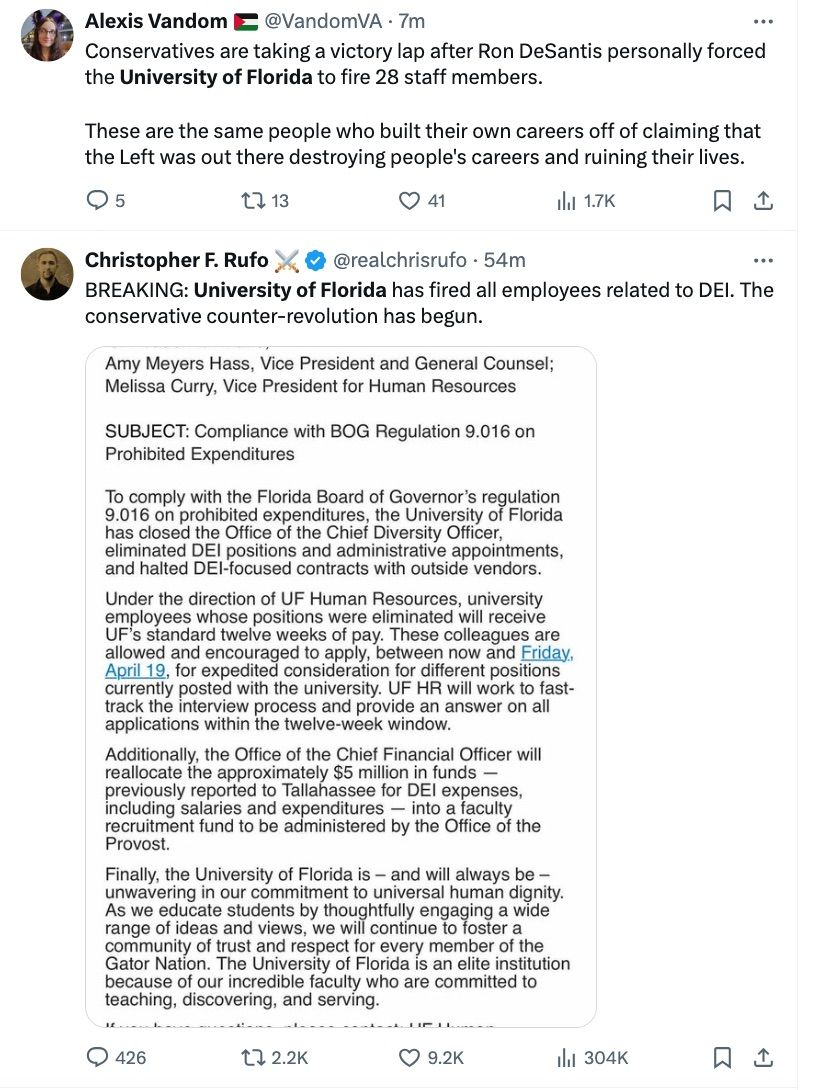Book Censorship News, March 8, 2024
Higher education is not immune to this current onslaught of censorship — but not in the way that right-wing media claims. As they speak out of one side of their mouth about “cancel culture” on campus, they use the other side to implement egregious policies and laws that actually impede the rights of students, staff, and faculty at these institutions.
Diversity, Equity, and Inclusion (DEI) has been a right-wing target over the last several years, and that has shown up in spades with book banning related to books written, published, or studied for/by those under the age of 18. So-called “Critical Race Theory” books, alongside books deemed as “Social Emotional Learning” or “Comprehensive Sexuality [sic] Education,” have been pulled in schools and public libraries nationwide amid the manufactured fervor.
But as much as the rhetoric has been about “protecting the kids,” it is very much not about the kids at all. If it were, then DEI departments or programs at public universities — where students are near-universally no longer minors — would not need to be disbanded. Texas outlawed DEI programs at all public universities, as did several other states. In Florida, the dismantling of higher education has an incubator program at New College. Last year, the state’s governor implemented new leadership at the public liberal arts school, which included installing completely unqualified political agitators to the institution’s advisory board. Students and faculty reported on the chaos happening in the school to begin the 2023-24 academic year, and even more recently, the institution saw sanctions leveraged against it by the American Association of University Professors for standards violations. Only 12 other institutions have ever been given these sanctions over the last 30 years.
Then the University of Florida fired dozens of employees last week who worked in DEI capacities.


This legislative session, colleges and universities continue to be targeted. In Indiana, the Attorney General has set up a snitch line that targets “socialist” educators. It is not limited to elementary, middle, and high school educators, which would be dangerous enough. It also puts a target on the backs of educators at colleges and universities in the state. As reported in Rolling Stone:
The new state website asserts it is non-partisan, claiming to be interested in rooting out “political ideology — either left or right.” But when he announced the launch of the portal earlier this month, [State Attorney General] Rokita made the bias of the project clear, insisting Eyes on Education exists to expose “examples of socialist indoctrination” in the classroom — and seeks to highlight “destructive” teaching practices that “divide kids from their parents” and from what Rokita deems “normal society.”
Take a peek at the current list of socialist indoctrination being reported to the state. Indiana University’s School of Medicine is included because of that school’s belief in DEI, Justice, and LGBTQ+ people. One of the examples of the egregious socialism at the school? The discussion of the gender unicorn to help people distinguish and understand gender identity and sexual identity.
How dare a school of medicine attempt to educate future doctors about gender and sexuality.
The snitch line is tied to legislation in the state, of course. Senate Bill 202 specifically addresses “excessive politicization and viewpoint discrimination that threatens our state’s workforce goals” in Indiana higher education. There is a lot of tiptoeing around in talking about this bill from the state’s GOP, given that censorship in higher education is a thing they’ve cried about for years — it only, of course, impacts the speech of their far-right representatives and no one else. They call it “intellectual diversity,” which simply means ensuring that students are exposed to “history” that never happened, to “research” that has zero basis or vetting, and what amounts to pushing things like PragerU as educational. The bill has passed through both chambers as of February 29. It would put the power of who sits on the governing board of public higher education institutions into the hands of the majority leaders in the state House and Senate, among several other provisions meant to shut down any initiatives or course focus on representation, diversity, equity, inclusion, gender, and other topics that right-wing politicians do not believe exist.
If it’s dangerous enough for this kind of legislation and behavior encouraged by state politicians when it comes to their talking points about “protecting the children,” what is the reasoning when it comes to campuses where the community is almost universally older than 18?
(It’s fascism).
Then, there’s what transpired at North Carolina Community Colleges over the last few months.
State Librarian of community colleges Birch Barnes sent an email out to the leadership at 27 state community colleges under his purview. He noted that thanks to the state’s new Parental Rights Law — attached to the email — all institutions would need to turn on tracking of what minor-aged patrons were borrowing from the library. If you’re thinking why “Community College” and “minors” are connected here, it’s because of a provision in the parental rights law wherein public schools operating certain programs with their local community college may request those community colleges to comply with the parental rights laws. Whether or not the community colleges choose to comply is up to the leadership of the institution itself.
But in this case, Barnes elected to comply without request. The law, which went into effect in August, was not something that became a worry at the community college level until the impending deadline to implement, December 31. Barnes quickly determined that the schools needed to comply; what made it tricky is that while he oversees all of the state’s community colleges, he only oversees the library software for 27 of those schools.
In his email to all leaders, Barnes noted that the library’s software for checkouts would make this kind of record-keeping easy to implement. That was not true. Indeed, it was quickly noted that the library’s borrowing history records would not be turned on solely for those 18 or under — the law dictates that 18-year-olds not yet emancipated are still minors — but instead, the borrowing records of every library user in the 27 community colleges would be accessible. This is a blatant violation of patron privacy rights, and it is a blatant ethical issue for libraries that uphold such privacy (something that became exceedingly relevant and vital following passage of the Patriot Act post-9/11).
Record tracking in the contingent of North Carolina Community Colleges was turned on for every user December 15, 2023. Barnes did not address concerns about this privacy violation for three weeks when he admitted libraries could make their own decisions about this following two considerations. First, he coordinated a meeting with a general counsel person who would discuss the implications of the parental rights law and urged everyone upset about the new policy attend the meeting; second, any library choosing not to track patron borrowing history to be in touch with him directly to resolve the issue.
And as it turns out, many librarians in the system did not even know the entire body of library user records were being tracked for nearly a month.
So what is it besides a gross misinterpretation of the law? Whether or not Barnes is complicit in these decisions matters, but not as much as the fact legislators know that by crafting laws like this, they’ll be able to continue digging their claws into new territory. New territory like higher education, where the proliferation of fear, guided by examples set with New College, makes compliance easier than standing up to fight.
All of this makes sense. This is about control and it is about delegitimizing the professional expertise, knowledge, and capacity of those who are educated. Who do not simply succumb to a platter of talking points handed over by groups or individuals with a clear, destructive, white supremacist agenda.
Keep your eyes on higher education in 2024. These won’t be the only stories. Indeed, these are the forerunners, much like the stories in 2020 and early 2021 were forerunners of where we are now in the destruction of libraries, public schools, and the professions within each.
Where we are in the systematic dismantling of democracy, period.
Book Censorship News: March 8, 2024


- “A children’s book is facing some backlash from residents in the Hanover area. The Family Book was read during toddler storytime at the Atlee Branch Library. It contained themes that offended some parents so much that they got up and left the event. They then went to a county supervisor who agreed it wasn’t appropriate.” This is a public library in Virginia…conveniently in the same area as massive bans in the school district. It does not stay in one place.
- No, we’re not rebranding book bans as “intellectual freedom” challenges.
- Fluvanna County High School Library (VA) is evaluating 11 books that the crisis actors complained about.
- Bartholomew Consolidated School Corp. (IN) will decide whether or not to ban People Kill People this week. The book will remain on shelves.
- South Western School Board (PA) will soon take up a vote on whether parents get to decide whether or not their student will read any book assigned in class. This week the board voted to allow misgendering students because fuck the kids, right?
- Louisiana legislators, not satisfied with how much they’ve ruined the state already, are proposing to remove obscenity law exemptions from schools and libraries. Worth reiterating that no such obscenity exists in either place, but okay.
- The status of the four books challenged in Palm Beach County Schools (FL) this school year.
- How the movement to ban books is silencing sexual assault and rape.
- “The parents who compiled the document object to Clint Smith’s 2017 book Counting Descent, for instance, because it allegedly glorifies police brutality, justifies the Black Lives Matter movement and ignores the context of the police killing of Michael Brown in Ferguson, Missouri. They write that the book omits that Brown ‘was a drug dealer with a record’ as if that might justify his killing. […] But it’s not just mentions of race and racism that are deemed objectionable; the parents take issue with virtually any difficult subject. In Flannery O’Connor’s renowned short story ‘A Good Man Is Hard to Find’ (1953), the treatment of topics such as murder, sin, selfishness and guilt are, according to these parents, of grave concern.” This is out of Granite Bay High School in California.
- The Letter Q will be restricted to high school students in Pasco County Schools (FL).
- The Oklahoma State Department of Education, who informed Edmonds Public Schools that they needed to ban The Glass Castle and The Kite Runner, agreed not to enforce that ban until the state supreme court ruled in the case brought to it by the school.
- “Sadie Matteucci, a teacher at Gainesville High School, said she had learned the number of book challenges has reached 25, and that those challenges come from six people. Matteucci chastised the board for allowing these challenges and the removal of books from school media centers.” The book is It Feels Good to Be Yourself and it will be returned to shelves in Alachua County, Florida, schools.
- Eight books that Northview Public Schools (MI) elected not to ban are back on the agenda this week since the Moms For Liberty member who initially complained did not like the outcome and is petitioning it. The books will not be removed.
- San Ramon Valley Schools (CA) have been hearing from homophobic community members via performances of “dirty book” passages at board meetings for MONTHS now.
- “The Chino Valley Unified School District board [CA] is considering a new policy that could remove books with ‘sexually obscene content’ from school libraries, classrooms, and all other district facilities.” A reminder that California passed a bill making school boards banning books against the law, but what that matters is zero.
- Fremont County Public Library in Wyoming will not be banning two Ellen Hopkins books: Tricks and Smoke.
- Stratford Public Schools (CT) might cut all of the remaining librarian positions in the district.
- “This concern arose when The Palmer Police Department had members of the public asking for the police to arrest the Palmer Public Librarians citing the Alaska criminal code defining ‘Distributions of obscene materials to minors.’” Okay then, “we don’t coparent with the government” means “we go to the police.”







